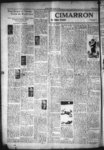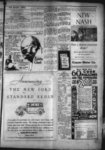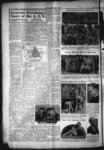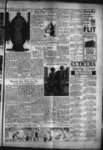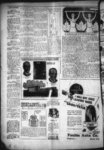| OCR Text |
Show f Friday, J'Jy 19, HAGNA TCIE3. MAGNA, UTAH Scenes and Perron? in the Current Nevs April 15 I received a letter from M. Clemenceau advising ms that Mr. Lloyd Georg had and the . suggestion, approved naked If I agreed. I replied In arree-mepersonal not expressing my of confirmation to tha subject came which President Wilson, by the French. (EtBunorall IPn3GMmig9 G Sttoy. 131, U IE IlMutrifcr ifaWlWiiii. (CrHikl, WwM right! mm,!, u, la vkata Uihiri! U, AIU. "WNU r !) a part grihlhliil.) ka Ao tffin Seventy-sevent- or all of onr Ore divisions then In Replying AprU 8 to tbe departFrance. The First was the only ment's cable, I emphasized that (t one nsed for the time being, the was not Intended that our units others, being placed In quiet sec- aha II replace the losses of British tors, each to relieve two French di- or French organisations, and thereAs our divisions were for onr artillery should be held In visions, more than twice as large as theirs readiness to follow when called It amounted to almost Immediate for," although It was posslbla that ths situation might become so serious that some of our Infantry unit will be forced to serve with British temporarily.' My Intention were further Indicated by saying: "Americana must not lose sight of the purpose to build up divisions and corps of their own, and also we matt avoid the tendency to incorporate our Infantry Into British divisions where It will be used up and never relieved.". CHAPTER XXXII My cable recommended .that tht Secretary of War Baker went to London to discuss with the Brit- Infantry of two divisions be sent by ish authorities the prospects for British shipping and two by our additional shipping and also the general subject of munitions. While there he sent me the following tele- of ten divisions. At the time of the German attack battalion of the American Sixth regiment of engineers was on duty behind the British Fifth army, engaged la railway construction and repairs. These troops were given arms and participated with ths British forces In the defensive operations until after the lines were stabilised. March 25, Once the question of supreme command wa settled ths energies of the allied armies could he directed with maximum effect toward a common end. While dark, days were atlll ahead, we were spared the chagrin of Inefficiency through lack of teamwork. commander. W have already had experience enough In trying to coordinate the operations of the allied armies, without success There has sever been real unity of action. between two Such or three armies la Impossible no matter who the commander In chief may be. Each commander la chief la Interested In hie own army and cannot get the other commander's point of view nor grasp the problem as n whole. I am in favor of a supreme commander and believe that the success of the allied cause depends upon It I think tbs necessary action should be taken by this council at once. I am in favor of conferring the supreme command upon Gen eral Foch." When I had finished Mr. Lloyd George came over to where I sal, took me by the hand and Bald: .1 agree fully with General Per ahlng. This is wall put Afttr some further informal dls- - 1018, embodying suggestions from the prime ter which shewed the deep anxiety sf (he British : "I have Just had a long talk with the prime minister. Be urges three proposals for your consideration, first, that our divisions la Franc be placed Immediately In line te relieve French divisions for service elsewhere, quiet sectors being chosen for troops with least training. Second, that all available engineer troops be taken from lines of communication work and sent to aid of British engineers preparing positions hack of present lines. It Is Urged that suspension of our work would be but temporary and that the work suggested la Impera tive. Third, that infantry be sent first of the .entire six divisions to be transported by British In view of present acute needs of that army No answer to the foregoing Is necessary until I see you tomorrow when we can discuss the suggestions fully.'. First Division Ordersd Into Lina. My diary notes the following: Chrumont, Friday, March 2U, 1918. Held conference with the secretary of war and Gen- r . era! Bliss yesterday on joint recommendations of - military f representatives of ths war council. Left Paris this morning for Chaumont At Petain'a request, the First division ordered to battle line, which Mr. Baker said people at borne would enthusiastically approve. Mr. Paul Cravath dined with us this evening and, speaking of unity, favored placing con- -. trol In the hands of a committee composed of Marshal Haig, General Petaln and myself. The situation had become so serious that the military representatives seemed to think It necessary to recommend that all previous plana for the shipment of American troops be disregarded and that nothing-bInfantry ibd machine gun units be shipped until other wise directed by the supreme war 'council. This they did In the form of a joint (or unanimous) note, which was, of course, approved by tbe supreme war council I was very much surprised at the attitude of General Bliss, our military representative with the council, as without his consent the jolm note could not have been submitted to the council When the joint note was presented to Secretary Baker I pointed out to him and General Bliss that the proposal if approved by the President, would place the disposition -- Of American units entirely In the hands of ths supreme war council and take thenrqulte out of our control even for tralnlng.anl would withnutdoubt destroy all possibility of our forming an American army. The secretary was si strongly Opposed te any such outcome as L minis-- - 0Cambrai . ut and after some dlscussloo be dictated his views In a cable to Pres! dent Wilson explicitly recommending that the control of our forces should he retained by our and that the Joint note be approved only in that sense. Reply From Wilson. The message- - forwarding r the joint note with Mr. Baker's comment was answered by cable from Washlngtoh dated March 30. which stated : "The President concurs in the Joint note f the permanent military representatives of the supreme war council In tbe senae formulated in your Now 67 March 28. and wtslies you to regard yourself authorised to decide questions df Immediate or replace- ment" It was thought thar tbla statement, eomlng from the President, would check, at least for the Time being, Aha demands of tbe allies that we provide units for building up their divisions, hut their Insistence continued. The President's message was followed March 80 by a cable from the department, which stated: The recommendation of secre that tary of war 4 President r prefereatlal transportation he given to Americas infantry and machine gun units lr present emergency understood and will be followed." It weal n A say that these units -- I own, but that present plana should It was go do further than this. my purpose not to become too deeply Involved in nn agreement 4hat would make It Impossible later to form onr own Independent force under our own officers. CHAPTER XXXIII Secretary Baker and 1 bad frequently discussed the question of a supreme allied commander, and we were both ready to accept it In principle when proposed. In response to t notice from Premier OemSaceau I Went, April 3, to Beauvais to meet with tbe supreme war council Arriving early, Colonel Boyd and I had to wait an hour at the Hotel de Villa before M. Clemenceao and Uoyd George came Into tha conference room. Marshal Haig, Generals Foch, Petaln, Sir Henry Wilson, Bliss, myself sere the others participating. Brigadier General Spiers acted as Interpreter, and Lieut Col. Sir Maurice Hankey, who usually accompanied Mr. Lloyd George, as recorder. The meeting was finally called to order by M. Clemenceau, who stated Its purpose, saying In substance: We have come together to settle a very simple question regarding the functions ef General Foch. I think, wa are all In agreement as to the of allied action, but there Is some difference In the understanding of General Fochs powers as conferred upon hint at the Doullens conference of March 2d General Foch will explain bis d difficulties." Foch Calls for Action. General Foch then set forth briefly bis situation, as follows: The power conferred by the Doullens conference were limited to 5f action between the the allies. They were conferred while the action was on. Tha power to has been construed to be limited to tbe time the allies were in action. That was March 28 at Doullens. Now we are at AprU 3. "Now that the two opposing armies are no longer In action but have stopped and are facing each other, there la nothing to There should be authority to prepare for action and direct IL So we are right back where we were, and nothing can be done until an action starts again." Lloyd Gtorg Plaads for Unity. Mr. Uoyd George then entered tbe discussion, saying substantially : We have bad more than three ' years of this war and we have not had unity of action daring that time. During tbe last year we have bad two kinds of strategy, one by Haig and another by Petaln, both' different, and nothing baa been gained. Tbe only thing that was accomplished was by General when be was in supreme command. "General Foch la now empowered tba action of, the to allied armies, bat this does not go far enough, as he has no authority to control except by conferring with the respective commanders In chlet He wants authority to prepare for action. I think the resoln-tlo- n made at Doullens should he modified so that we may hare a better understanding. . I should like te hear what General Bliss and General Pershing have to say." Parthing Gives His Views. I then gave toy view, which waa set forth In n brief memorandum prepared la pencil after the discussion began,- - as follows: "Tha principal of unity of command la undoubtedly the correct one for tho allies (o follow. I do not believe It 'Is posslbla to have unity of action without a supreme & CHAPTER XXXIV that the supreme effort must be made on our part and when units were sorely needed for immediate active service It waa found, much to my aurpriae, that, although the divisions then coming to France had been under training for six months or even more, they still contained a large percentage of nn trained men. Aa already pointed out the general staff, when called upon to provide men for special services, had relied upon taking them from combat divisions Instead of anticipating such requirements and segregating these specialists from ths Mart and training them as auch. This was n most vicious application In time of war of n very practice that had grown up In pur army In time of peace. It appears that during tha preparation of onr armies la tha World war no other plan was followed and tbe practice waa carried to auch an extent that divisions with, say 25.000 men, which should have been held Intact and each one perfected an organised team, were constantly called lupon to send large groups of their trained soldiers to other datles. Inspect Available Divisions. In view of their possible early employment 1 wanted especially to look Into tbe general state of efficiency of our available divisions and give some personal Instruction aboutf training. Going the rounds, I met, General Hlrschauer, who was one of the able French generals, and found him very enthusiastic about)' tba Second, which had been In lias at Sommedleu under his Now -April5.l9l8 50 Miles cuasloat a draft of tbe resolution was submitted which omitted reference to tbe American - army. Whereupon I called attention to tbe oversight, saying: I think this resolution should Include the American army. The arrangement la to be In force, as 1 understand it, from now on. anJ the American army will aoon be ready to function aa inch and should be Included aa an entity Ilka the British and French armies." There IF no American army yet as such." General Petaln Interjected, as Its salts are either In training or are amalgamated with tbe British and French." Pershing Has U. 8. Included. There may not be en American army in force functioning now, I but there soon will be. replied, and I want this resolution to apply to It when It becomes a fact Tbe American government la represented here at this conference and In the war, and any action aa to tbe supreme command that includes the British and French armies abould also Include the American army." The foregoing account of the conference may uot be an exact record of the language nsed, bat It Is given as my aid took It down. The following resolution was then read and adopted: General Foch Is charged by the British, French and American govof ernments with the the action of the allied armies on the western front; to this end there ts conferred on him all the power necessary for Its effective realisation. To the tame end tbe British, French and American government confide in General Foch the strategic direction of military operations. "The commanders In chief of tbe British, French and American armies will exercise to the fullest extent tbe tactical direction of their armies. Each commander In chief will have tbe right to appeal r t T - v' 1 . 4 j I I J III (3 J 1 Youngsters of Chicago's West sldejnade happy during the torrid apell by a shower improvised by the fire department 2 Federal authorities In Los Angeles dumping Into tho gutter 1,009 gallons of poisonous Jamaica ginger extract seised In raids, 8 Young John Jeffries of Greenville, Ky, who won the national marbles championship in Ocean City, N. J and was crowned King Johnny L" ' - , . Americas Rifle Shots Ready for Bisley Meet ."N, command, confirming my own opinion formed from observation and He said that without reports. donbt1 It was then aa efficient as any of his French divisions. The First was further advanced than Ground gained by German Offensive 25 ' AprU 17. Eg General Joa J Pershing CHAPTER XXXI -C- ontinued pertaining to three divisions, ths If the responsibility bad been Third, Fifth and mine 1 should not have hesitated a would be sent at once, and those of moment t0 P lot ttc Pattis any three other divisions about May L gram ELE nt a a VV any of tbe others and Its moral waa high at the prospect of going Into the battle line. Recent developments had brought the question of the employment of American troops ' into Immediate consideration. The President's qualified approval of tbe recommendation of (he supreme war council aa embodied In joint note No. 13, was seized upon by the allies and' construed as a concession for the unlimited absorption of our troops In their armies. No doubt my offer to General Foch leat encouragement to the allied vie. T Mr. Bakers visit to our armies during this critical period was fortuitous, as the problems that confronted us could then ho seen In their true perspective. He had an opportunity to meet the tilled leaders, both civil and military, and get In touch with conditions in ibo different countrlec Of still greater Importance, ho saw with his own eyes the building of our organization. He was n keen observer, with clear understanding and n logical mind, and obtained In n short time an accurate conception of our task and its A rr ' Tbe members of ths American rifle team at the Frankfort arsenal Philadelphia, where they were preparing for the international rifle championship to bo contested at Blaley, England. Left to right, standing, are R. H. McGarlty, T. Randle, F. J. Paffe, IL II. Jacobs, IL J. Adams, Maj. J. 8. Hatcher, head coach; G. M. Cpshaw, G. Slttlcr, H. F. Johansen, H. N. Remshaw, Left to right, kneeling, are G Sheldon, V. F. Hamer, Dr. E. Swanson, L. A. Wilkins, G. Evans, , Repairing Damage. Done li v m. by- - Beavers - HONORED BY OMAHA Iff1 difficulties. Before sailed for the letter quoted below, and, although we later discussed Its contents briefly. It la given as showing the reaction of at least part of the British pres at the time: April 5, 1918. Dear Mr. Secretary ; I noticed the other day that one of the British papers, in referring to the fact that plans had been made to send American troops to the assistance of the allies, stated this would relieve the British of tbe necessity of depleting the strength of the forces kept at home for defensive purposes. "This suggests to my mind n certain political phase of the British situation which may give ns adll tlonal explanation as to why Mr. home I Mr. Baker had. sent ;:y him wr V A is. tSS'.Sc T ' r - v Campflre Glrla repairing the damage caused by beavers to the rustic bridge made by them across the brook at their camp In Harrlman State park. New York. Industrious beavers ate away the living trees which formed the natural support at the land ends of the bridge, - a' Ja Father Edward J. Flanagan, who wan voted tbe first citizen" of Omaha, Neb, In recognition of hla outstanding achievements In public welfare In 193G Tbe selection was made froid a list of 37 prominent Omaha citizens by n committee of 15 past commanders of tbe American Legion, Father Flanagan was selected for the honor in view of his efforts In expanding the work of bis orphanage and boys home, which la known as "Father Flanagan's Home for Boys. OLYMPIC MISSIONARY Queen of the Convention of Ellcs Nt-vell- Salvation Army Lassie to hla government If in tils opinion hla army Is placed In danger by the Instruction! received from General Foch." . Allied Commander In Chief. Tbe Idea of an Silled commander In chief had been suggested and discussed many times unofficially but for various reasons, political and otherwise; It bad never been definitely adopted by tbe supreme Handing Out Doughnuts. apd British representatives are so urgent la their apfor assistance from America. peals Following this further, may I suggest that you give the matter serious thougbtt There la so very much at stake for us that It seems to me very frank representations should be made to the British government as to the urgency ef their' putting Into the army every possible man that ran bo mmtered to meet the Immediate emergency. , . . Lloyd George war council With the distrust that existed among the allies. 4TO Bn CONTINUED.) ijah not easy to bring about tbe decision In favorof a supreme and It was made possible There la the lory of the train enly by the extreme emergency of the situation. that hit the midget automobile and The designation of General Foch then had to slop to let the oo-as commander In chief of tbe al gineer have It taken out of hla eye New York Poet Bed armies In Franca was proposed Dr. Henry Nicse, veteran conau! to the United State from Argentina, has sailed from Los Angeles com-Binde- r, TjTI FI 7i I i : jT )T j ' ' aeteen-year-olCnlreralty of 'Vaehington stn- wa M m floren of the carnival which waa n feature ,nJ of the annual convention of Elks In Seattle, Wash. d on n visit to nil South American nation to fulfill the dual duty of promoting closer International re latlonshlp and understanding and acting aa an unofficial missionary for tbs 1932 Olympic games. |

